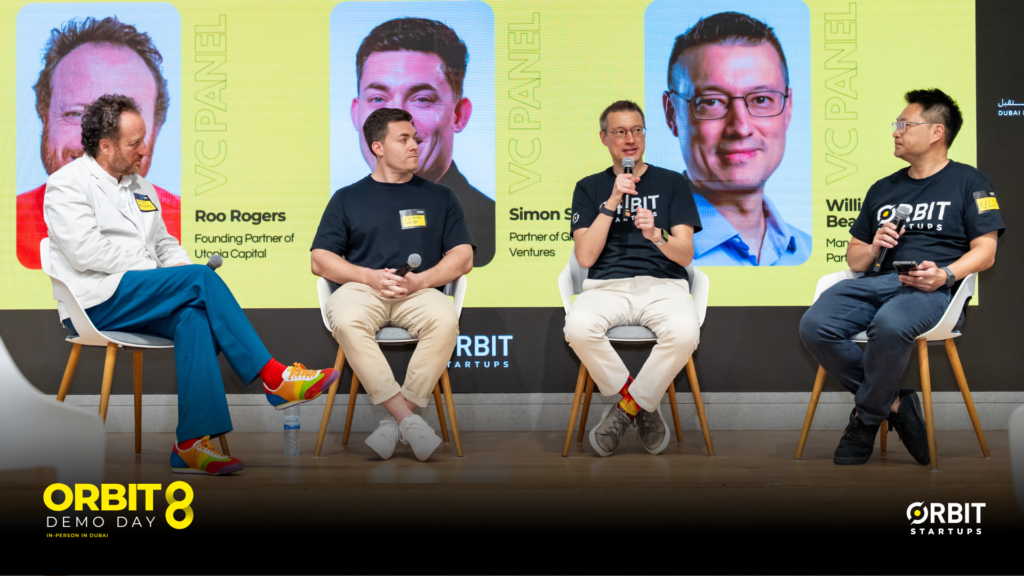When the spotlights hit the stage at Orbit 8 Demo Day, it wasn’t just another lineup of pitches — it was a live blueprint of how capital is reshaping the Middle East and North Africa. Three leading investors peeled back the curtain on where money is flowing, why it’s moving, and how today’s founders can ride the next wave of opportunity.

The conversation kicked off with Roo Rogers of Utopia Capital, whose lens spans Africa to Southeast Asia — and now, increasingly, the Gulf. Roo recounted how Kenyan e-commerce start-up, Powered by People, propelled by a female founder’s vision to digitize artisanal manufacturing, rewrote the script on supply chains. By uniting dozens of small producer cooperatives into a single digital marketplace, this venture didn’t just unlock liquidity for women-led workshops — it rewired the routes through which global fashion flows.
“What began as a five‑person operation is now scaling from Nairobi to Dhaka,” Roo reflected, underscoring how local ingenuity can leap continents in a few lines of code.
Yet the pulse of opportunity isn’t confined to legacy industries. Roo also championed Arkadiah, an AI‑driven forest‑mapping platform that transforms satellite imagery into verifiable carbon credits. In a world reeling from political headwinds in the U.S. climate agenda, he argued, “The fusion of AI breakthroughs with on‑the‑ground conservation is our best bet to keep carbon markets alive.”
For Roo, the lesson was clear: in MENA’s shifting sands, climate tech can bloom when data meets daring.
Simon Sharp of Global Ventures picked up the thread with a deep dive into supply chain tech’s unsung heroes. He painted a vivid picture of sprawling refineries hampered by single‑part failures — only to imagine a future where any worn valve or gasket can be 3D‑printed on demand. That’s the promise of his portfolio company Immensa, which converts legacy inventories into digital blueprints.
“When you can manufacture spare parts as easily as you order pizza,” Sharp mused, “you don’t just cut costs — you unlock entirely new scales of efficiency.” And for brands wrestling with last‑mile logistics across the GCC, he spotlighted Locad, a fourth‑party logistics play that orchestrates warehouse networks to ensure every click‑to‑doorstep journey is seamless.
Against that backdrop of tangible infrastructure, William Bao William of Orbit Startups offered a thought on AI’s quiet revolution. While headline‑chasing models seize the spotlight, William said, the true frontier lies in the “wrappers” — the bespoke applications that marry unique datasets to real‑world workflows. From Cairo’s DXwand, ride‑hail platforms mining customer conversations to Fleksy’s smartphone keyboard gathering the keystrokes that fuel personalization, these ventures are proving that value lives in the intersection of data and domain.
“You don’t win by building the biggest model,” William remarked. “You win by turning the right data into the right decisions.”
As the panel circled back to the big picture, a few themes crystallized. Fintech’s subverticals — from BNPL to robo‑advisory — remain magnets for capital, while cybersecurity’s urgency is only amplified by AI‑powered threats.
Yet perhaps the most provocative question came from Roo: will the West’s stage‑based fundraising playbook survive in markets where startups can sprint from zero to Series A in eighteen months? In his view, breaking free of rigid rounds could be MENA’s hidden ace, granting founders the agility to chase moonshots unburdened by convention.
Whether through autonomous bots mining enterprise data or human‑in‑the‑loop hybrids that translate insights into revenue, one thing was certain: MENA’s ecosystem is no longer playing catch‑up. It’s setting its own pace, wiring new digital arteries across old sands, and inviting a global audience to join the journey.
